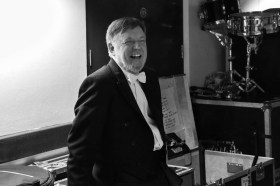Ricordi – Beyond 200: Celebrating 200 Years of Publishing Contemporary Music
Australia’s vital presence as a leader in the international contemporary music scene was firmly asserted last week at the launch of publishing house Ricordi’s bicentennial celebrations in London. The dual company of the world-class ELISION Ensemble and featured Ricordi protégé, Perth composer Liza Lim, essentially transformed what might have been a generic compositional commemoration into an inevitable salute to the thriving face of Australian New Music.
The unarguably prestigious event, packed to the walls with influential Londoners and the expat musical elite, took a sophisticated angle on the This Is Tuesday New Music series at King’s Place, the city’s sparkling and squeaky clean new chamber music venue.
Opening the programme was the braying, neighing, maniacal laughter of Lim’s Wild Winged-One (2007) for solo trumpet, drawn from fragments of her new opera The Navigator, which was mounted in all its lavish glory for this year’s Brisbane and Melbourne Festivals. A collaboration with Victorian poet-librettist Patricia Sykes, the opera is a romanza on transformation, unification, and “the contingency of living only one life in one world”.
Within this operatic context, the trumpet is associated by Lim with a “half-human, half-animal-bird figure” which we certainly didn’t need to read the programme note to recognise. At times insectile and at others dog-like in its bark, this lipsmacking, thigh-slapping, tongue-poking creature was conjured with all the hiss-pop-boing of a vivid and vibrant cartoonish world. For all its raspberries and its frantic, fluttering fingers, Tristram Williams’ trumpet became a megaphone, a kazoo, a fabulous distortion device for the curiously intelligible but wordless voice of a muttering, chattering, larger-than-life characterisation. Fuelled by a series of cockeyed and panting “parentheses”, lyrical lines were snatched up when they occurred and shouted out in brilliant fanfare, key tones creating welcome structural points for the ear. As much a spirited character study as a faultless feat of instrumental virtuosity, Wild Winged-One enjoyed a vigorous realisation in its UK premiere last night to what seemed a specialised and very much appreciative audience.
This was followed later in the programme by two other of Lim’s chamber music output, the first of which was Sonorous Body (2007) for solo clarinet, also built using musical and philosophical ideas from The Navigator. Performed by ELISION clarinettist Richard Haynes, Sonorous Body takes its name from a line of the opera’s libretto, “sonorous water searching for its sonorous body”. From this point of reference, Lim has created a liquefied, malleable pitch world using the intrinsic underwater timbral connotations of the clarinet. A meditation on ever-shifting connections, keyed pitches morph into an intangible, uncatchable, somewhat lugubrious melodic scenario of portamenti and unusually pleasing quartertone effect. Watery colorations were homogenous in both their content and form, supported by a bubbling and simmering of audible breath, keyclicks, fingerpops.
Together with Wild Winged-One, Sonorous Body formed part of Lim’s contribution to the TON installation project: a ‘Scena for mobiles, audience and instrumentalists’ conceived by Sabrina Hölzer with artist Volker Maerz, and commissioned by Zeitgenössische Oper Berlin and the ELISION Ensemble. This translated to us in last night’s concert version by the same players as a rare chance to experience complex, freshly-composed work performed without the crutch of the written score. Both Williams and Haynes projected a highly charismatic and notably memorised performance, each allowing the fantastic treat of a visually and energetically open communication from the full length of the performer’s body, without a music stand in sight.
Having said this, the remainder of the night’s programme was played with no less verve nor any less impressive instrumental expertise, albeit with reams of pages stretched from one side of the stage to the other. Considering the nature of the event, this must have been a happy and heartwarming sight for the Ricordi team.
Other works included important solo repertoire by Italians Franco Donatoni and Salvatore Sciarrino, as well as German composer Enno Poppe, all of which assumed a focus on one or several extended playing techniques which were developed to virtuosic proportions.
For me, Liza Lim was the evening’s starlet. Her composition is bright, new and groundbreaking, operational on a very different plane to the twittering and robotic computer chat, however humanised, of much New Music. Lim’s soundworld is natural and undulating at a subliminal level, toying with a beautiful organic gibberish which speaks equally to dramatic characterisation as to the shapes and structures of landscape-inspired Australian composition as we know it. It is little wonder Ricordi is proud of her.




